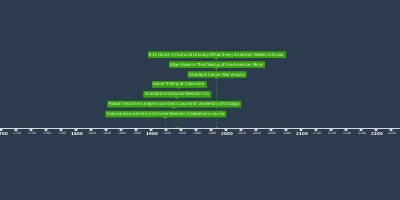1 dic 1949 anni - Adler, Hutchins, & Paepckes found Aspen Institute
Descrizione:
socratic discussion of ideas affecting and impacting American democracyFrom Aspen Institute Website
https://www.aspeninstitute.org/programs/executive-leadership-development/aspen-institute-seminar-history/
"For many years, the Aspen Institute was the Aspen Executive Seminar. Founded in 1950 as “The Aspen Institute for Humanistic Studies”, the Institute sought to bring leaders from diverse sectors and walks of life to engage in the fundamentals of moral reasoning: what does it meant to be human in a technological age? what does it meant to be a good citizen in a democratic society? what are the principles which allow for individual freedom and economic progress as well as justice, fairness, and the life of the spirit? The Executive Seminar was—and is—the perfect context in which to engage these fundamental questions as human being and citizen.
"The vision of the Institute’s Founders—Walter and Elizabeth Paepcke, Robert Hutchins, and Mortimer Adler—was informed by the conviction that the decisions we make are ultimately not technical but moral. Because our challenges are human challenges, that original vision prized the centrality of moral reasoning as something that could not be taught, though it could be learned. That is, the Executive Seminar from the beginning was understood as an opportunity to exercise our intellectual and moral muscles—to be confronted with new or unfamiliar ideas, to refine our own system of values, and to become more adept at navigating the moral infrastructure that allows us to live justly in a free society
"As the Institute’s Founders contemplated two World Wars and the Great Depression, they understood that democracy and free markets rested on fragile foundations. Understanding these foundations, they held, was essential for anyone doing business, or engaged in civic activity, or participating in the agencies of government. As Walter Paepcke, Chairman of the Container Corporation of America, put it in a letter advertising the first Executive Seminar:
"I should like to try an experiment and I would like your help in it.
"The background is this:
"Many business leaders have come increasingly to recognize that the most plaguing and persistent problems of business are not the technical problems—engineering, selling, accounting, and the rest. They are what Clarence Randall calls “human problems”; not merely industrial relations, but the whole galaxy of perplexities of man to man, man to society, and man and society to government. Scarcely one of our decisions, major or minor is not premised upon some aspect of these problems and our view of it.
"Yet we don’t do much about it. We send our brighter men to special professional and technical meetings and sometimes to special schools or courses. And in the case of Container at least, I think we get something from it. But these things, valuable as they are, don’t get at our most serious perplexities.
"Two wars and a great recession later, the human problems persist, as does the need to get at our most serious perplexities. For almost 70 years, the Executive Seminar has provided the foundation of our leadership and values seminars, all of which employ what we have come to call “the Aspen Method” of moderated, text-based dialogue. The Aspen Method infuses the seminars of our Global Leadership Network, Socrates Seminars, and the leadership seminars offered with our International Partners. In our Public and Policy Program as well, we prize at Aspen the attempt—through frank, moderated, thoughtful conversation—to uncover core values which help us frame problems and find solutions in an age of increasingly rapid change and moral and technical complexity."
ALSO
https://www.aspeninstitute.org/about/heritage/
"Chicago businessman Walter Paepcke (1896-1960), chairman of the Container Corporation of America, first visited Aspen, Colorado in 1945. Inspired by its great natural beauty, he envisioned it as an ideal gathering place for thinkers, leaders, artists, and musicians from all over the world to step away from their daily routines and reflect on the underlying values of society and culture. He dreamed of transforming the town into a center for dialogue, a place for “lifting us out of our usual selves,” as one visitor to Paepcke’s Aspen would put it.
"To make this dream real, in 1949 Paepcke made Aspen the site for a celebration of the 200th birthday of German poet and philosopher Johann Wolfgang von Goethe. The 20-day gathering attracted such prominent intellectuals and artists as Albert Schweitzer, Jose Ortega y Gasset, Thornton Wilder, and Arthur Rubinstein, along with members of the international press and more than 2,000 other attendees.
"That year, Paepcke created what is now the Aspen Institute. He was a trustee of the University of Chicago, and his participation in its Great Books seminar, led by philosopher Mortimer Adler, inspired the Institute’s Executive Seminar. The seminar is a forum based on the writings of great thinkers of the past and present. Through reading and discussing selections from the works of classic and modern writers, leaders better understand the human challenges facing the organizations and communities they serve. “The Executive Seminar was not intended to make a corporate treasurer a more skilled corporate treasurer,” said Paepcke, “but to help a leader gain access to his or her own humanity by becoming more self-aware, more self-correcting, and more self-fulfilling.”
expanded to arts, physics, etc. as well
Aggiunto al nastro di tempo:
Data:
1 dic 1949 anni
Adesso
~ 75 years ago
